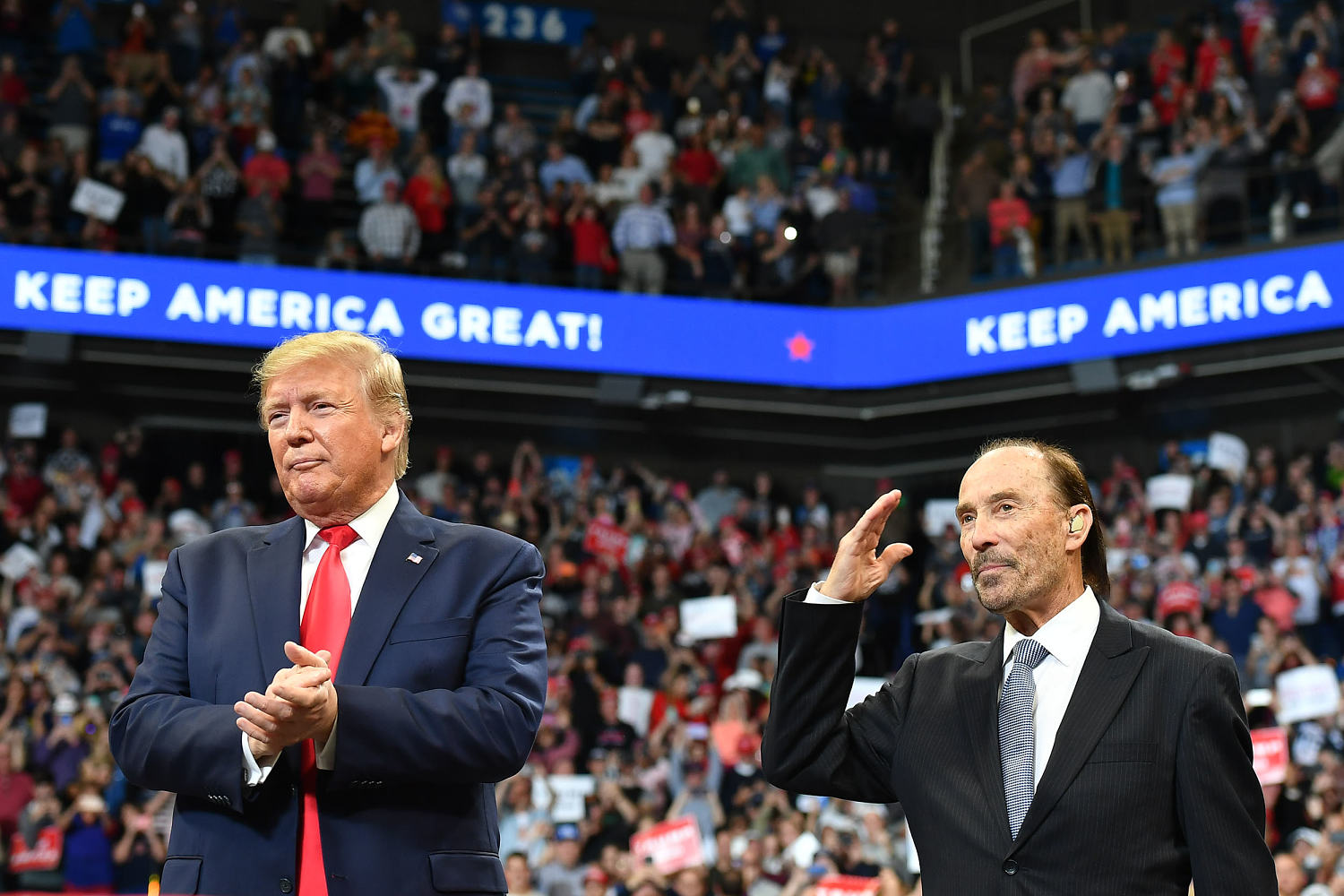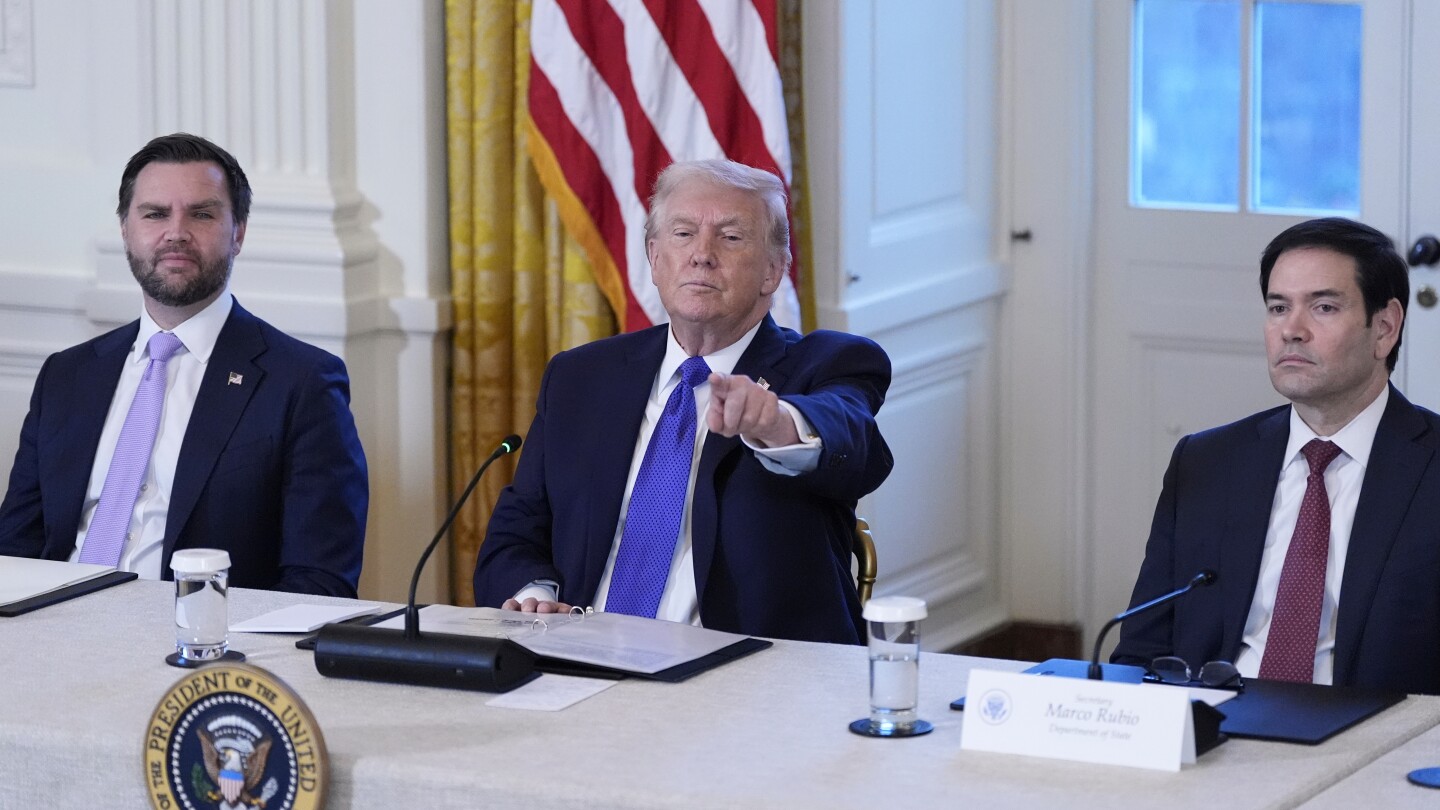The Dictatorship
Trump took over the Kennedy Center. And then placed his allies on the board.

President Donald Trump has officially commandeered the John F. Kennedy Center for the Performing Arts, the Washington institution that’s partially funded by the federal government and has been known — up until now, at least — as a major hub for artistic and cultural performances.
Trump announced last week that he was removing the Kennedy Center’s longtime chairman, David Rubenstein, and naming himself the chairman. He also said he’d replace members of the board of trustees and falsely claimed that the center had hosted drag shows targeting young people. The context here is that conservatives obsessively complain about — and often have sought to ban — art and cultural institutions they don’t like. And drag shows, both real and imagined, have become a scapegoat for conservatives to promote their censorship efforts.
On Wednesday, the Kennedy Center’s new board officially voted to make Trump chairman. Here are some of the people he has tapped to serve on the board:
- Himself
- Second lady Usha Vance
- White House chief of staff Susie Wiles
- Susie Wiles’ mother, Cheri Summerall
- Deputy Chief of Staff Dan Scavino
- Trump Adonor Patricia Duggan
- Country singer Lee Greenwood
- Allison Lutnick, wife of commerce secretary nominee Howard Lutnick
- Sergio Gor, director of the Office of Presidential Personnel
- Emilia May Fanjul, wife of Trump donor and sugar magnate Pepe Fanjul
- Pamela Gross, first lady Melania Trump’s former White House adviser
- Dana Blumberg, wife of Trump-aligned businessman and New England Patriots owner Robert Kraft
- Andrea Wynn, wife of Trump-aligned businessman Steve Wynn
- Mindy Levine, wife of New York Yankees President Randy Levine
The Kennedy Center’s longtime president, Deborah Rutter, had recently said she would leave her position at the end of the year, but on Wednesday she announced her early departure. Trump ally Richard Grenell will take her position in the interim.
I can only imagine the sort of programming this peculiar assortment of people will come up with. Perhaps Trump-supporting rapper Lil Pump will have room in his schedule. Or, maybe, right-wing comedian Tony Hinchcliffe.
One of the best summations of what Trump appears to be after with this power grab, and what he stands to gain, has come from The Washington Post’s Robin Givhan, who wrote a piece explaining why Trump’s moves here are “petty but powerful.”
“The president doesn’t merely want to break the government bureaucracy. He wants to reprogram what the arts mean to the American people,” she wrote. “He is coming after their heart. Their imagination. Their elusive spirit.”
This passage from Givhan explains it all:
Trump is setting himself up to be the culture police. That’s tantamount to regulating the degree to which people are encouraged to think broadly, to conceive of ways to make the impossible a reality, to marvel at the fragile majesty of nature, to protest, to laugh, to find cathartic release. To dream with abandon. That is the power of the arts, after all.
I agree with Givhan here. Art can be a form of resistance in times such as ours, in which far-right forces are bearing down on people who dare to use the arts to express views they disagree with. All the more reason to be suspicious of Trump controlling one of the most esteemed artistic institutions in the country.
Ja’han Jones is The ReidOut Blog writer. He’s a futurist and multimedia producer focused on culture and politics. His previous projects include “Black Hair Defined” and the “Black Obituary Project.”
The Dictatorship
Trump signs executive order to protect Venezuelan oil revenue

WEST PALM BEACH, Fla. (AP) — President Donald Trump’s new executive order on Venezuelan oil revenue is meant to ensure that the money remains protected from being used in judicial proceedings.
The executive order, made public on Saturday, says that if the funds were to be seized for such use, it could “undermine critical U.S. efforts to ensure economic and political stability in Venezuela.”
The order comes amid caution from top oil company executives that the tumult and instability in Venezuela could make the country less attractive for private investment and rebuilding.
“If we look at the commercial constructs and frameworks in place today in Venezuela, today it’s uninvestable,” said Darren Woods, CEO of ExxonMobil, the largest U.S. oil company, during a meeting convened by Trump with oil executives on Friday.
During the session, Trump tried to assuage the concerns of the oil companies and said the executives would be dealing directly with the U.S., rather than the Venezuelan government.
Venezuela has a history of state asset seizures, ongoing U.S. sanctions and decades of political uncertainty.
Getting U.S. oil companies to invest in Venezuela and help rebuild the country’s infrastructure is a top priority of the Trump administration after the dramatic capture of now-deposed leader Nicolás Maduro.
The White House is framing the effort to “run” Venezuela in economic terms, and Trump has seized tankers carrying Venezuelan oil, has said the U.S. is taking over the sales of 30 million to 50 million barrels of previously sanctioned Venezuelan crude, and plans to control sales worldwide indefinitely.
“I love the Venezuelan people, and am already making Venezuela rich and safe again,” Trump, who is currently in southern Florida, wrote on his social media site on Saturday. “Congratulations and thank you to all of those people who are making this possible!!!”
The order says the oil revenue is property of Venezuela that is being held by the United States for “governmental and diplomatic purposes” and not subject to private claims.
Its legal underpinnings are the National Emergencies Act and the International Emergency Economic Powers Act. Trump, in the order, says the possibility that the oil revenues could be caught up in judicial proceedings constitutes an “unusual and extraordinary threat” to the U.S.
The Dictatorship
Trump pushes a 1-year, 10% cap on credit card interest rates. Banks balk

NEW YORK (AP) — Reviving a campaign pledge, President Donald Trump wants a one-year, 10% cap on credit card interest rates, a move that could save Americans tens of billions of dollars but drew immediate opposition from an industry that has been in his corner.
Trump was not clear in his social media post Friday night whether a cap might take effect through executive action or legislation, though one Republican senator said he had spoken with the president and would work on a bill with his “full support.” Trump said he hoped it would be in place Jan. 20, one year after he took office.
Strong opposition is certain from Wall Street in addition to the credit card companies, which donated heavily to his 2024 campaign and have supported Trump’s second-term agenda. Banks are making the argument that such a plan would most hurt poor people, at a time of economic concern, by curtailing or eliminating credit lines, driving them to high-cost alternatives like payday loans or pawnshops.
“We will no longer let the American Public be ripped off by Credit Card Companies that are charging Interest Rates of 20 to 30%,” Trump wrote on his Truth Social platform.
Researchers who studied Trump’s campaign pledge after it was first announced found that Americans would save roughly $100 billion in interest a year if credit card rates were capped at 10%. The same researchers found that while the credit card industry would take a major hit, it would still be profitable, although credit card rewards and other perks might be scaled back.
About 195 million people in the United States had credit cards in 2024 and were assessed $160 billion in interest charges, the Consumer Financial Protection Bureau says. Americans are now carrying more credit card debt than ever, to the tune of about $1.23 trillion, according to figures from the New York Federal Reserve for the third quarter last year.
Further, Americans are paying, on average, between 19.65% and 21.5% in interest on credit cards according to the Federal Reserve and other industry tracking sources. That has come down in the past year as the central bank lowered benchmark rates, but is near the highs since federal regulators started tracking credit card rates in the mid-1990s. That’s significantly higher than a decade ago, when the average credit card interest rate was roughly 12%.
The Republican administration has proved particularly friendly until now to the credit card industry.
Capital One got little resistance from the White House when it finalized its purchase and merger with Discover Financial in early 2025, a deal that created the nation’s largest credit card company. The Consumer Financial Protection Bureau, which is largely tasked with going after credit card companies for alleged wrongdoing, has been largely nonfunctional since Trump took office.
In a joint statement, the banking industry was opposed to Trump’s proposal.
“If enacted, this cap would only drive consumers toward less regulated, more costly alternatives,” the American Bankers Association and allied groups said.
Bank lobbyists have long argued that lowering interest rates on their credit card products would require the banks to lend less to high-risk borrowers. When Congress enacted a cap on the fee that stores pay large banks when customers use a debit card, banks responded by removing all rewards and perks from those cards. Debit card rewards only recently have trickled back into consumers’ hands. For example, United Airlines now has a debit card that gives miles with purchases.
The U.S. already places interest rate caps on some financial products and for some demographics. The Military Lending Act makes it illegal to charge active-duty service members more than 36% for any financial product. The national regulator for credit unions has capped interest rates on credit union credit cards at 18%.
Credit card companies earn three streams of revenue from their products: fees charged to merchants, fees charged to customers and the interest charged on balances. The argument from some researchers and left-leaning policymakers is that the banks earn enough revenue from merchants to keep them profitable if interest rates were capped.
“A 10% credit card interest cap would save Americans $100 billion a year without causing massive account closures, as banks claim. That’s because the few large banks that dominate the credit card market are making absolutely massive profits on customers at all income levels,” said Brian Shearer, director of competition and regulatory policy at the Vanderbilt Policy Accelerator, who wrote the research on the industry’s impact of Trump’s proposal last year.
There are some historic examples that interest rate caps do cut off the less creditworthy to financial products because banks are not able to price risk correctly. Arkansas has a strictly enforced interest rate cap of 17% and evidence points to the poor and less creditworthy being cut out of consumer credit markets in the state. Shearer’s research showed that an interest rate cap of 10% would likely result in banks lending less to those with credit scores below 600.
The White House did not respond to questions about how the president seeks to cap the rate or whether he has spoken with credit card companies about the idea.
Sen. Roger Marshall, R-Kan., who said he talked with Trump on Friday night, said the effort is meant to “lower costs for American families and to reign in greedy credit card companies who have been ripping off hardworking Americans for too long.”
Legislation in both the House and the Senate would do what Trump is seeking.
Sens. Bernie Sanders, I-Vt., and Josh Hawley, R-Mo., released a plan in February that would immediately cap interest rates at 10% for five years, hoping to use Trump’s campaign promise to build momentum for their measure.
Hours before Trump’s post, Sanders said that the president, rather than working to cap interest rates, had taken steps to deregulate big banks that allowed them to charge much higher credit card fees.
Reps. Alexandria Ocasio-Cortez, D-N.Y., and Anna Paulina Luna, R-Fla., have proposed similar legislation. Ocasio-Cortez is a frequent political target of Trump, while Luna is a close ally of the president.
___
Seung Min Kim reported from West Palm Beach, Fla.
The Dictatorship
Changes to the US vaccine recommendations are sowing confusion and could harm kids

Dr. Molly O’Shea has noticed growing skepticism about vaccines at both of her Michigan pediatric offices and says this week’s unprecedented and confusing changes to federal vaccine guidance will only make things worse.
One of her offices is in a Democratic area, where more of the parents she sees are opting for alternative schedules that spread out shots. The other is in a Republican area, where some parents have stopped immunizing their children altogether.
She and other doctors fear the new recommendations and the terminology around them will stoke vaccine hesitancy even more, pose challenges for pediatricians and parents that make it harder for kids to get shots, and ultimately lead to more illness and death.
The biggest change was to stop blanket recommendations for protection against six diseases and recommend those vaccines only for at-risk children or through something called “shared clinical decision-making” with a health care provider.
The phrase, experts say, is confusing and dangerous: “It sends a message to a parent that actually there’s only a rarefied group of people who really need the vaccine,” O’Shea said. “It’s creating an environment that puts a sense of uncertainty about the value and necessity or importance of the vaccines in that category.”
Health Secretary Robert F. Kennedy Jr.who helped lead the anti-vaccine movement for years, said in announcing the changes that they better align the U.S. with peer nations “while strengthening transparency and informed consent.”
But doctors say they are sowing doubt — the vaccines have been extensively studied and proven to be safe and effective at shielding kids from nasty diseases — at a time when childhood vaccination rates are already falling and some of those infectious diseases are spreading.
On Friday, the American Academy of Pediatrics and more than 200 medical, public health and patient advocacy groups sent a letter to Congress about the new childhood immunization schedule.
“We urge you to investigate why the schedule was changed, why credible scientific evidence was ignored, and why the committee charged with advising the HHS Secretary on immunizations did not discuss the schedule changes as a part of their public meeting process,” they wrote.
Many don’t know what ’shared decision-making’ means
O’Shea said she and other pediatricians discuss vaccines with parents at every visit where they are given. But that’s not necessarily “shared clinical decision-making,” which has a particular definition.
On its website, the Advisory Committee on Immunization Practices says: “Unlike routine, catch-up, and risk-based recommendations, shared clinical decision-making vaccinations are not recommended for everyone in a particular age group or everyone in an identifiable risk group. Rather, shared clinical decision-making recommendations are individually based and informed by a decision process between the health care provider and the patient or parent/guardian.”
In this context, health care providers include primary care physicians, specialists, physician assistants, nurse practitioners, registered nurses and pharmacists.
A pair of surveys conducted last year by the Annenberg Public Policy Center at the University of Pennsylvania suggested that many people don’t fully understand the concept, which came up last year when the federal government changed recommendations around COVID-19 vaccinations.
Only about 2 in 10 U.S. adults knew that one meaning behind shared decision-making is that “taking the vaccine may not be a good idea for everyone but would benefit some.” And only about one-third realized pharmacists count as health care providers to talk with during the process, even though they frequently administer vaccines.
As of this week, vaccines that protect against hepatitis A, hepatitis B, rotavirus, RSV, flu and meningococcal disease are no longer universally recommended for kids. RSV, hepatitis A, hepatitis B and meningococcal vaccines are recommended for certain high-risk populations; flu, rotavirus, hepatitis A, hepatitis B and meningococcal vaccines are recommended through shared decision-making — as is the COVID-19 vaccine, although that change was made last year.
Shortly after the federal announcement Monday, Dr. Steven Abelowitz heard from half a dozen parents. “It’s causing concern for us, but more importantly, concern for parents with kids, especially young kids, and confusion,” said Abelowitz, founder of Ocean Pediatrics in Orange County, California.
Though federal recommendations are not mandates — states have the authority to require vaccinations for schoolchildren — they can affect how easy it is for kids to get shots if doctors choose to follow them.
Under the new guidelines, O’Shea said, parents seeking shots in the shared decision-making category might no longer bring their kids in for a quick, vaccine-only appointment with staff. They’d sit down with a health care provider and discuss the vaccine. And it could be tougher to have a flu clinic, where parents drive up and kids get shots without seeing a doctor.
Staying the course as challenges mount
Still, doctors say they won’t let the changes stop them from helping children get the vaccines they need. Leading medical groups are sticking with prior vaccine recommendations. Many parents are, too.
Megan Landry, whose 4-year-old son Zackary is one of O’Shea’s patients, is among them.
“It’s my responsibility as a parent to protect my child’s health and well-being,” she said. “Vaccines are a really effective and well-studied way to do that.”
She plans to keep having the same conversations she’s always had with O’Shea before getting vaccines for Zackary.
“Relying on evidence and trusted medical guidance really helps me to make those decisions,” she said. “And for me, it’s not just a personal choice for my own son but a way to contribute to the health of everybody.”
But for other families, confidence about vaccines is waning as trust in science erodes. O’Shea lamented that parents are getting the message that they can’t trust medical experts.
“If I take my car to the mechanic, I don’t go do my own research ahead of time,” she said. “I go to a person I trust and I trust them to tell me what’s going on.”
Abelowitz, the California doctor, likened the latest federal move to pouring gasoline on a fire of mistrust that was already burning.
“We’re worried the fire’s out of control,” he said. “Already we’ve seen that with measles and pertussis, there are increased hospitalizations and even increasing deaths. So the way that I look at it — and my colleagues look at it — we’re basically regressing decades.”
___
The Associated Press Health and Science Department receives support from the Howard Hughes Medical Institute’s Department of Science Education and the Robert Wood Johnson Foundation. The AP is solely responsible for all content.
-

 The Dictatorship11 months ago
The Dictatorship11 months agoLuigi Mangione acknowledges public support in first official statement since arrest
-

 The Dictatorship4 months ago
The Dictatorship4 months agoMike Johnson sums up the GOP’s arrogant position on military occupation with two words
-

 Politics11 months ago
Politics11 months agoBlue Light News’s Editorial Director Ryan Hutchins speaks at Blue Light News’s 2025 Governors Summit
-

 Politics11 months ago
Politics11 months agoFormer ‘Squad’ members launching ‘Bowman and Bush’ YouTube show
-

 Politics11 months ago
Politics11 months agoFormer Kentucky AG Daniel Cameron launches Senate bid
-

 The Dictatorship11 months ago
The Dictatorship11 months agoPete Hegseth’s tenure at the Pentagon goes from bad to worse
-
Uncategorized1 year ago
Bob Good to step down as Freedom Caucus chair this week
-

 Politics9 months ago
Politics9 months agoDemocrat challenging Joni Ernst: I want to ‘tear down’ party, ‘build it back up’








